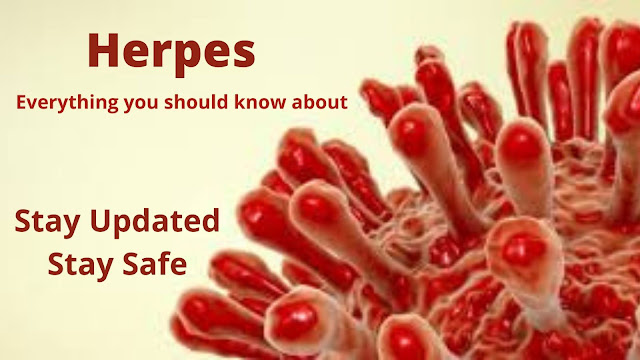Know how to reduce the risk of spreading herpes, the ways to limit herpes recurrences, products beneficial to herpes sufferers & dating norms for herpes sufferers
 |
| Continue with the article |
What is Herpes? Is herpes a serious disease?
Herpes simplex is a viral infection that is highly contagious and spread by contact with body fluids or lesions. Known as an STD (sexually transmitted disease) or STI (sexually transmitted infection), the main reason behind the spread of herpes is sexual activity that includes vaginal intercourse, anal intercourse, kissing, and oral sex.
The herpes simplex virus (HSV) are of 2 types:
- Herpes simplex virus type 1 (HSV-1) or herpes simplex 1 or oral herpes - usually above the waist like herpes in mouth or herpes on lip
- Herpes simplex virus type 2 (HSV-2) ) or herpes simplex 2 or herpes genital - usually below the waist
HSV-1 or cold sores are generally acquired in childhood. Most people with oral herpes have been infected from non-sexual contact with saliva.
A person can get infected with HSV-2 during genital contact with someone who is also infected with a genital HSV-2 infection. However, receiving oral sex from a person with an oral HSV-1 infection can result in HSV-1 genital infection.
Herpes is very common. Approximately 90% of American adults have been exposed to HSV-1 by the age of 40. As per the reports by the Centers for Disease Control and Prevention (CDC), at least 1 out of 6 Americans ranging from 14 years to 49 years of age are infected with HSV-2. An annual increase in new genital herpes infections among US citizens by 776,000 has also been observed. A recent nationally representative study finds that HSV-2 is more common in women, as approximately 1 out of 4 women compared to 1 out of 5 men are infected. It was also found the virus is more common in blacks, 45.9%, as compared to 17.6% of whites.
HSV-2 infections have increased by 30% among Americans since the 1970s. Young white teens are experiencing the greatest increase. Today HSV-2 infection is five times greater than it was 20 years ago among 12 to 19-year-old white teens. Young adults from 20 years to 29 years are now twice as likely to be infected. The main reason behind the increasing number of genital herpes infections caused by HSV-1 is due to people with cold sores performing oral sex.
The HSV-2 infection increases the risk of acquiring HIV infection approximately 2 to 4 fold.
Although herpes is associated with sores, many people don’t know that they have contracted herpes because they have no sores. Asymptomatic shedding can occur even though there are no visible symptoms.
What are the herpes symptoms?
Herpes sores are in the facial area for oral herpes, while genital herpes involves the penis, vulva, rectum, and areas below the waist.
Symptoms usually develop within 2 to 20 days after contracting the herpes virus.
Symptoms can last from days to weeks and can vary in severity depending on the person.
Tingling may begin up to 2 days before the appearance of blisters for those who have suffered a few episodes.
Many people are asymptomatic and have no visible sores and are unaware that they have herpes, but can still spread the virus (Asymptomatic shedding).
Less common infections occur in the eyes, on the hands, and in the esophagus.
Herpes is most contagious when sores and symptoms are present.
Herpes infection can be passed to a newborn during childbirth and can cause neonatal herpes, which can be life-threatening to the infant.
Symptoms may include:
- Cold sores or fever blisters
- Blisters that break open and form sores and ulcers then scabs
- Tingling
- Burning, itching, and pain in the infected area
- Fever
- Sore throat
- Flu-like symptoms
- Swollen lymph nodes in neck or groin depending on whether it is oral or genital herpes
- Pain when urinating
- Vaginal discharge
- Penile discharge
- Headaches
- Muscle pain
- Difficulty swallowing
- Pelvic pain
- Asymptomatic (When are no symptoms, but you can still shed the virus.)
Is it safe to date with herpes? How tell if you have herpes?
Can diet help herpes?
- Dairy products contain high amounts of lysine to arginine. Yogurt and cheeses are among this group.
- Fruits usually are higher in lysine. Figs, mangos, papayas, apples, and apricots come in this group.
- Vegetables, especially broccoli and cauliflower contain lysine in high amounts. Note that greens like spinach and kale are almost equal when it comes to the lysine/arginine ratio.
- H-Eraser delivers concentrated amounts of L-lysine with its ability to dissolve and to be absorbed by your body.
- chocolate
- nuts
- seeds
- alcohol
- caffeine
- oats
- lentils
- wheat
- gelatin
- large amounts of red meat
- protein supplements
- processed foods
- By including H-Eraser and H-Eraser +, help suppress outbreaks naturally without side effects.
Herpes outbreaks what causes recurrences? What triggers herpes?
- Weakened immune system
- Excessive alcohol
- Sun exposure
- Binging on nuts and most seeds
- Binging on chocolate
- Too much L-arginine in your diet
- Surgery
- Stress
- Fatigue
- Colds or fever
- Some medications
- Lack of sleep
- Tight clothing
- Vigorous sex
- Menstruation
- Glycolic acid and other facial peels
- Permanent Makeup application
- Laser resurfacing












0 Comments
Welcome to Freshness, a magazine on health and beauty products, health and beauty tips. If you have any doubts or queries feel free to comment.